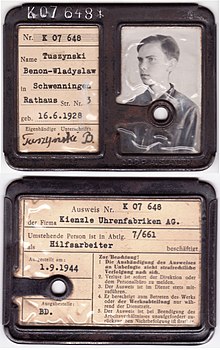identification card
In the broader sense, an identity card is a private or official document that represents the identity of the holder in writing and with the claim of liability and, if necessary, combines with findings by a competent authority, according to which certain legal characteristics (such as nationality ) or other authorizations, qualifications or other circumstances tied to the person of the owner exist.
Examples of different functions of badges

With an ID you can
- an access permit to certain areas must be proven
- membership in a community can be proven
- proof of authorization to perform a certain action, for example driving a motor vehicle - driving license
- a specific (regular) customer in a store can be associated with a specific customer number - customer card
- evidence that they have exercised a certain profession or position - for example with a seafarer's book or diplomatic passport
- the authorization to exercise sovereign powers can be proven - ID card
particularities
- Paradoxically, the identity card in Germany is not proof of citizenship regardless of the entry of a nationality . With a citizenship card, however, German citizenship is bindingly proven.
- Provided with a signature function, an ID enables legally binding and conclusive transactions in electronic business transactions (e.g. the citizen card in Austria).
The word “ID” is also used (in Germany and Austria) for documents that do not contain any personal data (example: ticket for public transport).
Content of the ID
The ID mostly contains personal data such as surname, first name, date of birth, address, etc. Depending on the intended use, IDs can also have a photo ( photo ID ) or other biometric features as well as an image of the owner's signature .
A distinction is made between official photo identification and other identification.
In the case of ID cards, there is also an official title , the department and an official seal on the ID.
Usability
Since several types of ID can serve the same purpose, such as proof of identity or group membership, they are often regarded as equivalent for these purposes. The following ID cards are most commonly used in everyday life:
- Identity card (Austria)
- Identity card
- passport
- Social security card (only valid in conjunction with an identity card or passport)
While the identity card and the passport are often considered to be equivalent for establishing identity and - for example at border controls - for proving nationality, the nationality and only partially the identity can not be proven with the driver's license, however, with the identity card not the driver's license. It is also important to note to what extent and by which body the correctness of the content of the ID card is checked in detail. Authorities that issue driver's licenses, for example, have a special responsibility to determine whether someone is licensed to drive, while their primary responsibility is not to establish and certify identities. This also results in restrictions on usability: In most cases, a driver's license cannot be passed a border control, nor is it sufficient, for example, for the identification required in Germany when opening bank accounts, while an identity card is used for a traffic check by the police will be of limited value to a motorist.
Other IDs are of constant importance for certain professional groups in everyday working life, for example
- Press pass
- Police ID card
- Troop ID for soldiers
- Military police card
- Student ID with which students identify themselves as members of a university
- ID card for civilian personnel of the Bundeswehr and administrative employees in the field
Some ID cards also serve as proof of permission or authorization, e.g. B.
- traffic
- Driving of watercraft
- Certificate of competency (leisure, commercial shipping)
- Driving motor vehicles
- Driving license as proof of a driving license
- Driving aircraft
- Parking / transit permit
- Driving of watercraft
- Wireless
Other types of ID are only relevant in very specific situations and are only used for specific control persons or employees of the issuing body. Examples are:
- Disability pass (Austria)
- Disabled parking permit
- Blood donation card
- member card
- ID cards for guns or gun owners:
- Competition ID (player pass)
- Company ID / corporate ID (e.g. Deutsche Bahn AG ) or company ID
For reasons of operational security, the corresponding access badges may not be passed on to third parties - not even colleagues in a company. Such a breach of duty can have consequences under labor law and justify an employee's termination without notice .
Other meanings
- In finance, an ID is also a statement of figures, e.g. B. Bank ID or VAT ID .
- In common parlance, one speaks of a "proven expert / specialist" if a person has demonstrated an excellent qualification. Another meaning is the characterization “someone has shown himself to be particularly energetic”, if a person has shown energy or “his work is a great proof of his ability”, when a work reflects the ability of the author.
See also
literature
- Valentin Groebner : The appearance of the person. Wanted poster, ID and control in the Middle Ages. CH Beck, Munich 2004, ISBN 3-406-52238-6 .
- Rotraud lattice, Moritz Strasser: ID cards as carriers of signature processes. In: Data protection and data security. Vol. 29, No. 2, 2005, ISSN 1614-0702 , pp. 74-77, download (PDF; 53 kB) .


